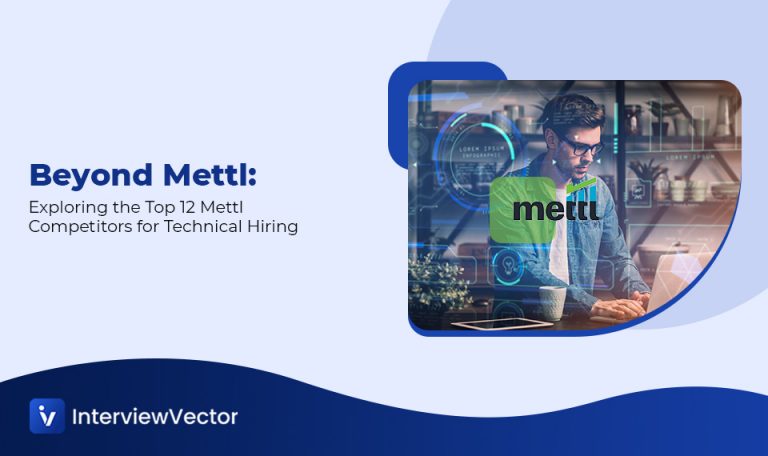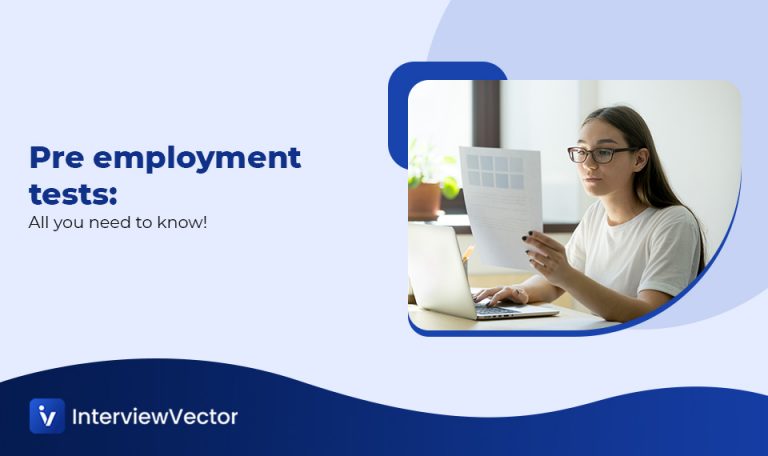Introduction
As the business world accelerates, HR leaders face increasing pressure to provide their workers with the skills required to keep up with the ever-changing expectations. It has never been more critical to maximize the contributions of existing employees and ensure that new hires have the necessary skills, as hiring budgets continue to shrink and resources become more constrained.
Every new employee has the potential to either bridge or improve an organization’s skill gaps. To bridge these gaps, businesses are turning to competency assessment tools—robust solutions that allow applicants to be identified based on their long-term potential rather than just their present skills. These assessments go beyond typical hiring processes, focussing on a candidate’s ability to complete specific tasks, display essential soft skills such as teamwork, and contribute to the company’s overall growth.
Organizations can better emphasize the important skills for a particular job with the help of competency assessments. Providing structured evaluations allows these tools to help HR and TA leaders target suitable talent quicker, thereby strengthening the odds of developing a strong and future-oriented workforce.
The Deloitte report indicates that 78% of business leaders regard these tools as fundamental for both closing skill gaps and bolstering workforce skills. This blog will look into the function of competency assessment tools, methods for their application, best practices, hurdles, and an assessment of today’s leading tools.
Understanding Competency Assessment Tools
The goal of competency assessment tools is to determine a candidate’s ability to do important tasks required for success in a role. The tests assess a wide range of skills, including technical knowledge and behavioral qualities such as problem solving, capacity for management, and emotional intelligence.
The SHRM found that 70% of organizations used competency assessment tools for employee evaluation systems, demonstrating their importance in current HR practices. Additionally, competency evaluations provide a metrics-based strategy for evaluating both possible new hires and active team members, allowing organizations to make informed choices about development, promotions, and hiring.
What Are The Common Types Of Competency Assessment?
1. Self-Assessment
People are guided to conduct an assessment of their own competencies with the use of structured instruments such as checklists, surveys, or reflective questionnaires. This type of assessment promotes self-awareness in helping people identify their strengths, weaknesses, and developmental needs. Normally, this is the first step in planning personal development.
2. Manager Assessment
Supervisors or managers check the competencies of the employee based on observed performance, behavior, and outcome. This approach is really very informative about the level up to which an individual satisfies the job expectations. The managerial assessments are often used while conducting performance appraisals, probationary periods, or promotion evaluations.
3. 360-Degree Feedback
This thorough review collects comments from diverse sources: peers, subordinates, supervisors, and the individual under analysis. Technical competencies and skills will be measured regarding dimensions that include leadership and teamwork among others. Use of this multi-perspective approach guarantees a balanced and holistic appreciation of any individual’s abilities.
4. Technical Ability Evaluation
This approach tests job-based competencies by applying practical application exercises, written exams or simulation. It focuses its emphasis on the evaluation of one’s competence in performing technical aspects of his occupation. A software developer can be given a coding examination while an accountant may undergo a review in financial analysis.
5. On-the-Job Observation
Employees are found performing their routine jobs in their real working environment. This type of evaluation measures the effectiveness with which a person uses his skills, knowledge, and behavior in the real world. It provides direct proof of their competence and is particularly useful for those jobs that require hands-on experience.
Implementing Competency Assessment Tools
A strategic strategy is crucial for HR and TA leaders who want to integrate competency assessment tools into their operations.
Define core competencies: Collaborate with managers to articulate the critical skills, behaviors, and traits required for success in all roles. These skills must be consistent with the larger organizational goals.
Select the Right Tool: The unique requirements of your organization are critical in identifying the best competency assessment tool. The assessment instrument must be adaptable and customisable for evaluating technical capabilities, leadership potential, or team connections.
Train Your Team: Both HR departments and hiring managers must learn how to conduct and interpret evaluation data correctly.
Integrate with Existing Systems: To ensure workflow efficiency, make sure the competency management tool you choose is compatible with your existing HR systems, such as an ATS or LMS.
When you incorporate competence assessments into your talent acquisition and development strategy, you hire the best individuals while also creating a workforce prepared for the future.
Best Practices In Competency Assessment
Using competency management tools effectively can substantially improve both talent acquisition and the development of employees. In order to optimize their worth, HR directors should focus on the following crucial best practices.
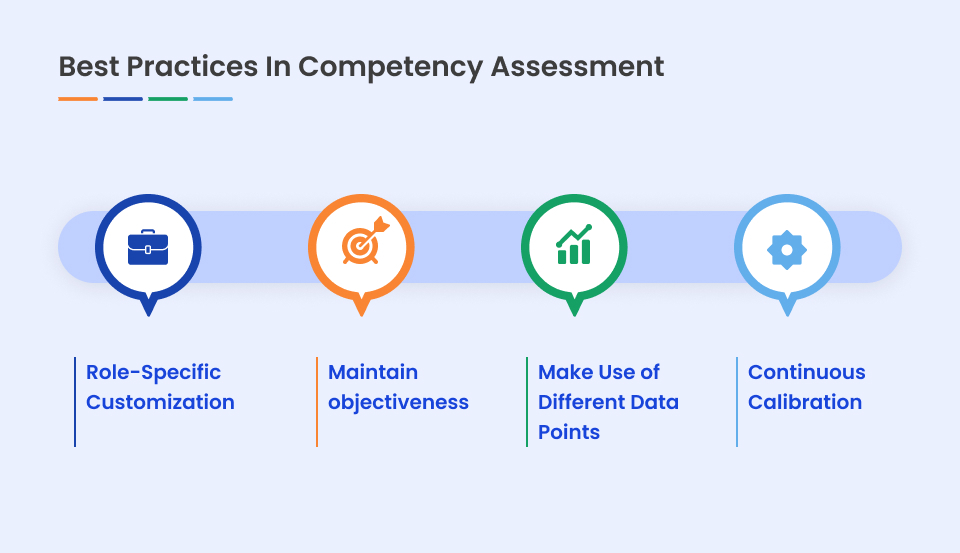
- Role-Specific Customization
Competency assessments must be customized to the specific requirements of the position you’re trying to fill. Every job requires a certain set of hard and soft skills that are necessary for success. For example, when employing a software engineer, you should evaluate their technical skills, such as their ability to code, solve problems, and comprehend certain programming languages. Nonetheless, soft skills like communication, adaptability, and teamwork are as crucial for long-term success in professions where collaboration is essential. - Maintain objectiveness
Competency assessments’ capability to compile unbiased data on applicants is one of its main advantages. It is impossible to attain impartiality if there is a lack of justice or transparency. Candidates should be shown that the test’s goal is to evaluate critical skills related to the position.
When you plan to recruit a project manager, it is essential that you assess their leadership, communication, and organizational skills. A candidate’s ability to control their expectations and ensure that the entire process is perceived as impartial and fair is enhanced by their early grasp of this information. Teams are able to maintain objectivity in the assessment of every candidate when they use defined scoring standards. - Make Use of Different Data Points
While assessment tools are useful, they are not the only factor. We achieve the greatest hiring results by combining several types of data. Structured interviews, in addition to competency assessments, can reveal a candidate’s ability to think critically and give practical examples of their experience. Reference verification can improve the candidate’s past performance by providing additional deep insights.
Human resources leaders can gain a full knowledge of a candidate’s total potential by evaluating data from different sources, reducing the risk of a disastrous hire and ensuring alignment with the organization’s cultural values and future goals. - Continuous Calibration
The level of expertise required for the job changes as the business grows and market shifts emerge. You should systematically examine and update the competencies under consideration. Consider remote work; in many positions, communication and self-management abilities are more crucial than ever.
To maintain their relevance, hiring managers must constantly examine their competency frameworks and align them with the organization’s evolving goals and the most recent industry trends. Continuous measurement ensures that your evaluation tools remain effective and allows you to retain the right talent for the future.
Challenges in Competency Assessment Software
While competency assessments tools are useful, they provide their own set of challenges
- Integration Difficulty: Many firms struggle to incorporate new solutions, such as ATS or LMS, into their existing systems. Choosing tools that integrate seamlessly is critical for reducing disruption.
- Resistance to Change: Staff and management may be opposed to change the manner they regularly hire. Resolve this issue by emphasizing the benefits of the new technologies and providing training to help people adopt them.
- Interpreting Data: For those who are unfamiliar with the tool, understanding competency assessment findings can be challenging. Having comprehensive training and resources ensures that teams make more educated decisions based on the results available.
- Time Investment: While integrating these tools requires an initial investment in setup and training, the long-term benefits of hiring and development decisions based on more information far outweigh the initial time commitment.
Top 12 Competency Assessment Tools
As they seek best competency assessment tools, HR and TA leaders enjoy a great variety of options. To support informed decisions, here are the six best tools, all highly rated by G2, the trusted source for software evaluations.
InterviewVector

InterviewVector creates an innovative solution for companies who need to rapidly increase workforce while maintaining quality. This platform focuses on being a leading interview-as-a-service platform by providing expert evaluations based on abilities from a variety of industries. Businesses that use InterviewVector report significant gains in both time-to-hire and candidate experience, two crucial performance factors for recruitment departments. InterviewVector is ideal for firms that want to make informed, data-driven hiring decisions while reducing the workload for their internal workforce.
Key Strength: Reduces time-to-hire by 40% while maintaining accurate talent assessments through structured interviews supervised by current specialists.
G2 Rating: 4.7/5
TalentGuard
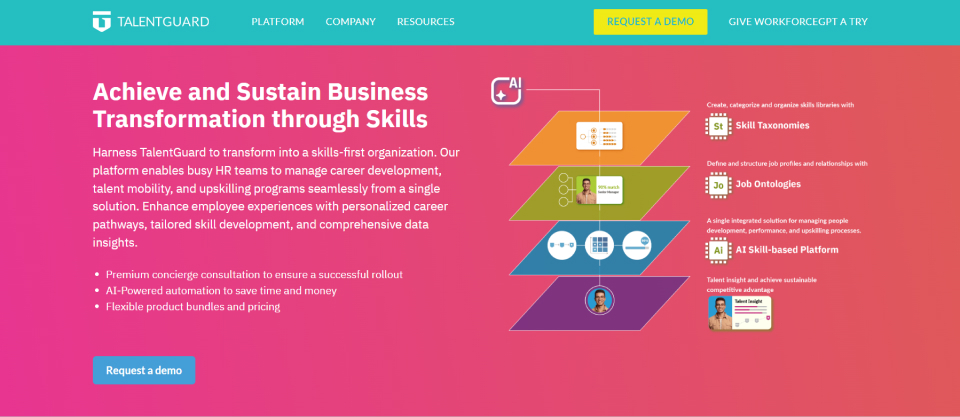
TalentGuard allows you to manage competences in addition to tools for career path planning and succession planning. This program excels at uncovering skill gaps and providing practical insights for employee growth, promoting suitability for both recruiting and retaining people. The combination of all of these characteristics enables hiring managers to manage career progression while aligning competencies to company goals, resulting in continuous development.
Key Strength: Provides detailed insights into shortages of skills, allowing for exact succession planning and growth in staff across roles.
G2 rating: 4.4/5
iMocha
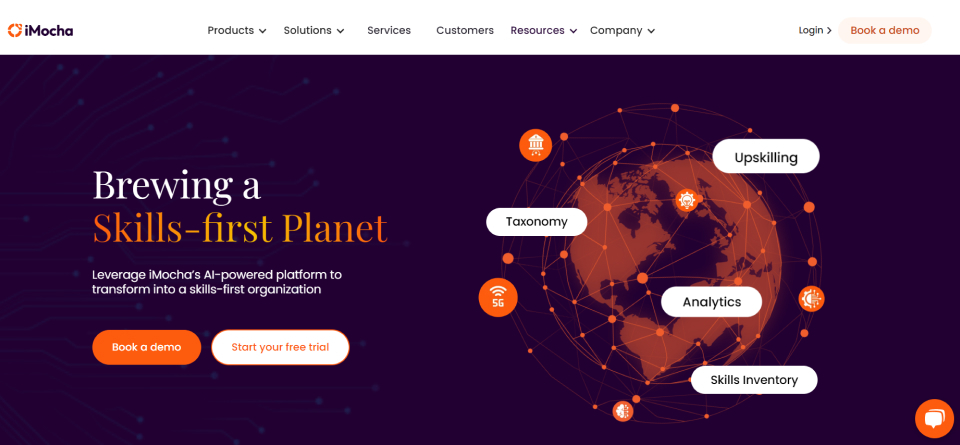
iMocha is known for its AI-powered competency assessments, providing companies with the ability to evaluate both technical and soft skills. Its customizable assessments are well-suited for tech-heavy industries, but the platform’s flexibility makes it applicable across a range of roles and sectors. The AI-driven analytics provide real-time insights into candidate performance, ensuring a more data-driven approach to hiring.
Key Strength: The AI-powered platform offers real-time skill assessments, lowering screening time for technical professionals.
G2 Rating: 4.5/5
Pointerpro

Pointerpro’s primary goal is to provide interactive and individualized exams that engage candidates and provide detailed information about their capabilities. Recognizing its adaptability, the tool enables hiring managers to create assessment tools that are tailored to the specific needs of a certain function. Businesses can use Pointerpro’s ability to adapt exams to uncover important talents that represent their goals for improving hiring success.
Key strength: Provides fully customizable exams that are tailored to specific tasks, increasing applicant involvement and generating deeper insights.
G2 rating of 4.3/5
Cognology

Cognology blends performance management and competency assessment to provide a comprehensive solution for employee recruiting and development. HR leaders can collect vital data on applicant and employee know-how, which is critical for career planning and talent development, as well as skill improvement through these platforms. Cognology’s combination of performance evaluation and competency management provides outstanding effectiveness in nurturing organizational growth.
Key Strength: Integrates performance and competency data to assist HR professionals in implementing targeted training and development activities.
The Competency Group
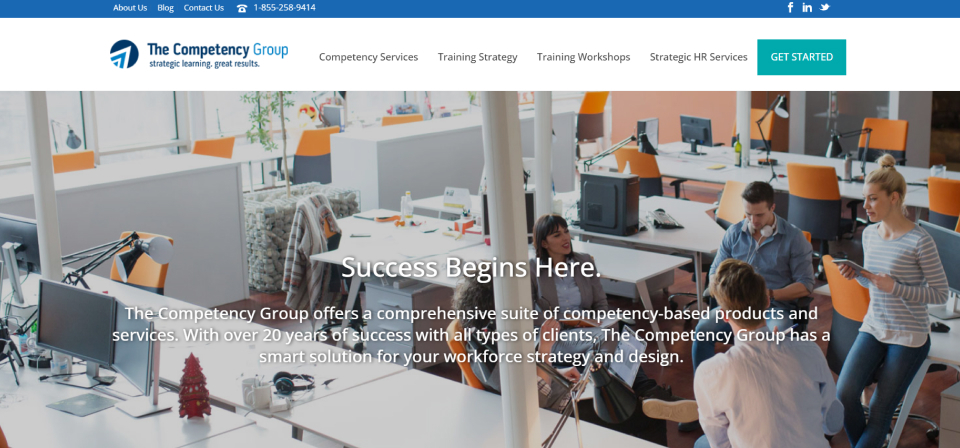
The Competency Group’s primary mission is to provide comprehensive, role-focused competency profiles that are aligned with long-term organizational objectives. Organizations can use the full competency framework to better connect employees and candidates to jobs, increasing productivity and job satisfaction. The tool is a common resource for businesses looking to create personalized competency models that drive growth and strategic personnel planning.
Key Strengths: Creating specific skill profiles that match roles and individuals improves an organization’s overall efficiency over time.
G2 rating: 4.6/5
Each of these tools has unique strengths that allow hiring managers to better analyze, develop, and retain elite personnel, thereby improving overall organizational performance.
Plum

Plum utilizes industrial-organizational psychology to evaluate candidates through tests which measure their cognitive abilities and personality traits as well as social intelligence. The platform delivers talent information to enhance the recruitment process and new employee onboarding and staff development strategies.
Key Strength: The system concentrates on assessing transferable abilities and potential skills to support continuous talent growth.
G2 Rating: 4.4/5
Vervoe

Vervoe functions as an AI-driven hiring solution that enables customized skill and simulation testing to evaluate job candidate abilities. The system performs automatic assessments to grade candidates while determining their rankings thus simplifying candidate selection.
Key Strength: AI assessment capabilities allow organizations to evaluate both technical and soft skills which generates complete candidate capability assessments.
G2 Rating: 4.6/5
Talogy (Previously Caliper)

Talogy provides a full assessment platform that evaluates a candidate’s cognitive ability together with personality characteristics and job-specific competencies. The system enables organizations to improve their recruitment choices and design better employee development plans.
Key Strength: The main advantage of their assessment system lies in its ability to connect individual potential to organizational goals through detailed evaluations.
G2 Rating: 4.7/5
Mercer Mettl

The online assessment platform Mercer Mettl provides organizations a diverse collection of tools for evaluating technical and cognitive skills together with behavioral competencies. The system enables users to produce tailored tests and code tests and advanced analysis functions to help recruiters base their selection decisions on data.
Key Strength: The product features a full assessment platform that provides strong monitoring instruments to protect exam authenticity.
G2 Rating: 4.5/5
Questionmark

Questionmark functions as an assessment solution which enables users to develop tests and exams and distribute them while generating reports. This platform delivers multiple sample questions types while generating performance analytics which measure candidate competency in different job roles.
Key Strength: The platform provides secure scalability which makes it appropriate for compliance and certification assessment needs.
G2 Rating: 4.⅖
Highmatch

Berke from Highmatch functions as an assessment instrument for prospective employees through which it measures personality characteristics alongside problem-solving aptitudes for role-specific success predictions. Profiles designed by this system help job applicants meet the required requirements in their roles.
Key Strength: The assessment methodology at this platform matches candidate characteristics directly to company culture and specific job requirements.
G2 Rating: 4.4/5
Each of these tools has unique strengths that allow hiring managers to better analyze, develop, and retain elite personnel, thereby improving overall organizational performance.
Future of Competency Assessment Tools
As technology and automation improve, the outlook for best competency assessment tools appears to be positive. The World Economic Forum predicts that due to rapid technological change, 50% of all jobs will require reskilling by 2025. Assessments of skills will play an important role in identifying current skill shortages and driving targeted reskilling initiatives.
The next wave of solutions will most likely combine AI-enhanced analytics with improved linkages to learning platforms, allowing firms to customize training based on individual competencies. As companies prioritize skill development, these tools will become increasingly important for hiring and workforce strategy.
Conclusion
Competency assessment tools provide HR and TA leaders with a strategic edge by allowing them to hire and develop talent based on objective data-driven observations. According to research published by the Center for Creative Leadership, organizations that use competency assessments such as the Leadership Assessment have a 40% lower turnover rate among their high-performing employees, demonstrating the importance of these tools to organizational success.
When leaders in human resources select best practices and the right resources, they can bridge skill gaps while also preparing a workforce for a future that is adaptable, skilled, and aligned with company goals. Including these tools in your hiring and development process is now necessary rather than optional.



